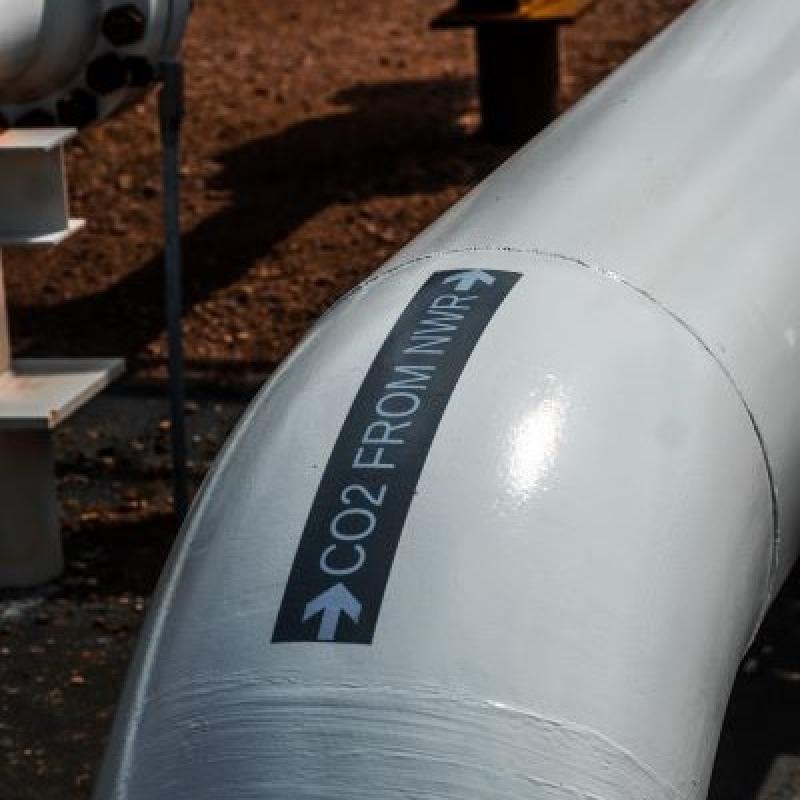
Transporting the hydrocarbons that power our lives and economies, but also emit climate-warming gases, is a key component of Wolf Midstream’s business. But the Calgary-based firm also operates a carbon pipeline to help mitigate the effects of these operations.
Wolf is the developer of the Alberta Carbon Trunk Line (ACTL), a $1.2-billion, 240-km pipeline from Alberta’s Industrial Heartland near Edmonton to a site near Clive, about halfway between Edmonton and Calgary.
Finished in June 2020, the ACTL can move up to 14.6 million tonnes of carbon dioxide per year, which can be injected into depleted oil reservoirs to mitigate the impact of the gas on the climate.
The concept is not new. Canada’s Enbridge, for example, is developing a carbon dioxide pipeline transportation and sequestration hub near Corpus Christi, Tex. with Oxy Low Carbon Ventures. Also in the United States, Summit Carbon Solutions is developing a multi-billion-dollar carbon pipeline snaking across the Midwest.
ACTL is billed as one of the world’s largest carbon capture and storage projects, and has received a final investment decision to extend further into Alberta’s Industrial Heartland to maximize its potential.
About Wolf Midstream
Formed in 2016 through an investment from the Canada Pension Plan Investment Board (CPP Investments), Wolf acquires and develops midstream infrastructure in Western Canada.
It operates oil pipelines in the greater Edmonton area and a natural gas liquids system that can produce approximately 70,000 barrels per day of products like ethane, propane and butane.
Wolf took an interest in carbon capture and formed an agreement with Calgary-based Enhance Energy Inc. on the construction and operation of the ACTL in 2018.
Wolf became the owner and operator of the ACTL’s carbon capture and pipeline transportation assets. Enhance remained the owner and operator of the carbon dioxide utilization and sequestration portion of ACTL through its enhanced oil recovery operations.
Then-Wolf CEO Gord Salahor said in a press release accompanying the announcement, “The ACTL is a desirable infrastructure asset for Wolf because it represents the core of an expandable network capable of facilitating many carbon mitigation options for emitters over the long term.”
Wolf declined an interview with SustainableBiz for this story.
The ACTL project
The ACTL was announced almost two decades ago but faced an arduous process before reaching the finish line in 2020.
First announced in 2004, the ACTL faced delays caused by events like the 2008 recession and an oil price crash in 2014.
The ACTL received hundreds of millions in funding from Wolf through CPP Investments, the Canadian and Alberta governments, and private backers.
Carbon dioxide is currently captured at North West Redwater Partnership’s refinery and Nutrien’s Redwater fertilizer facility, then liquefied and pumped through the ACTL for underground storage or used to squeeze out more barrels of oil by being injected into a reservoir.
Kevin Jabusch, the CEO of Enhance, was quoted in a press release: “We are putting CO2 (carbon dioxide) to use. We permanently keep CO2 out of the environment, while producing low-carbon energy. Not only are we reinvigorating our rural energy economy at a time when it is needed most, but we are playing a key role in advancing a sustainable solution to global energy requirements.”
Since operations began, the ACTL has moved and helped sequester at least four million tonnes of carbon dioxide.
Its maximum annual capacity of 14.6 million tonnes of carbon dioxide, which is 20 per cent of current oil sands emissions, was designed with exceed capacity in mind so the ACTL can connect to more facilities and storage reservoirs.
Extending the ACTL to Alberta’s Industrial Heartland
To further support the decarbonization of Alberta’s industries, Wolf announced it has begun construction to extend the ACTL into the core of the Alberta’s Industrial Heartland and into the Edmonton Region.
Alberta’s Industrial Heartland, spanning five counties and 582 square kilometres, hosts numerous petrochemical companies with an interest in carbon-capture projects.
In 2022, Wolf and its partners were selected by the Alberta government to develop a carbon sequestration hub to serve large facilities in the heartland.
The extension is named the ACTL Edmonton Connector and received approval from the Alberta Energy Regulator and other governing agencies. At full capacity, Wolf said it will be able to move approximately seven million tonnes of carbon dioxide per year.
Companies have reached out to Wolf to join the ACTL. Air Products Canada signed an agreement with Wolf to transport carbon dioxide from its under-construction Net-Zero Hydrogen Energy Complex.
"Wolf is leveraging the excess capacity of ACTL with the new ACTL Edmonton Connector to further support key net-zero projects which are critical to the future of our province and country," Jeff Pearson, president of Wolf Carbon, said.
Wolf’s U.S. expansion
After completing the ACTL, Wolf set its sights on the U.S. It spun off Wolf Carbon Solutions US in 2021 to build a similar pipeline project facilitating carbon capture efforts.
The Mt. Simon Hub, a 451-kilometre pipeline crossing Illinois and Iowa, is proposed by Wolf Carbon Solutions and its partner ADM to reduce the greenhouse gas emissions of Iowa’s agricultural industry.
The project is projected to transport 12 million tonnes of carbon dioxide per year, with construction set to begin in Q2 2025.










